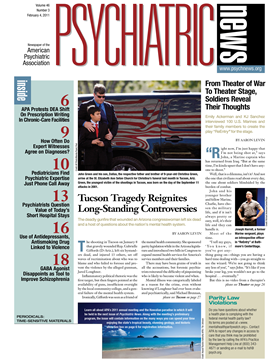The association between variations in the serotonin transporter gene and the development of depression in response to life stress—first elucidated in a now-famous 2003 report in Science—has been confirmed by meta-analysis.
Moreover, the analysis refines the association by showing that specific stressors, such as childhood maltreatment or the presence of a specific medical condition, appear to be especially predisposing to depression if an individual has the short allele—the S allele—of the 5-HTTLPR gene. The findings contradict an earlier, smaller meta-analysis that was published in the Journal of the American Medical Association.
The authors analyzed 54 studies on the relationship between variations in 5-HTTLPR (the gene that codes for the serotonin transporter) and the development of stress in response to various forms of life stress. They found strong evidence that the gene does indeed moderate that relationship.
The meta-analysis was published online in the Archives of General Psychiatry on January 3.
The association between 5-HTTLPR and response to stress was first published by Avshalom Caspi, Ph.D., and colleagues in a 2003 paper in Science titled “Influence of Life Stress on Depression: Moderation by a Polymorphism in the 5-HTT Gene.” It was a landmark finding, the first evidence of a gene-by-environment interaction in the development of depression.
“Our study both confirms that Caspi was right and hopefully offers some lessons on how to do these gene-by-environment studies,” said lead author of the Archives meta-analysis, Srijan Sen, M.D., an assistant professor of psychiatry at the University of Michigan. “We found that studies looking at specific stressors, such as childhood maltreatment or the presence of a medical condition, were better able to detect the interaction between the 5-HTTLPR variant and depression. Also, studies that did in-depth interviews with subjects, as opposed to studies that use questionnaires or phone interviews, were more likely to detect the association.”
The Caspi study has been cited thousands of times in the scientific literature and generated enormous excitement about the possibility for gene-by-environment research. But in 2009, Neil Risch, Ph.D., of the Institute for Human Genetics at the University of California, San Francisco, and colleagues published an analysis of 14 studies in JAMA. The report, titled “Interaction Between the Serotonin Transporter Gene, Stressful Life Events, and Risk of Depression,” yielded no evidence that the gene—either alone or in interaction with stressful events—was associated with depression.
But in an interview with Psychiatric News, Sen explained that the JAMA study focused on studies that simply asked subjects to report the number of “stressful life events” they had experienced and did not include many other studies that looked at the interaction between variations in the serontonin gene and specific life stressors.
Caspi, in comments to Psychiatric News, noted that a 2007 report in Molecular Psychiatry (“The Moderation by the Serotonin Transporter Gene of Environmental Adversity in the Aetiology of Mental Illness: Review and Methodological Analysis” by Uher and Mcguffin) had illuminated a pattern that was appearing in analyses replicating his original 2003 finding: studies that ascertained stress and depression via sensitive face-to-face clinical interviews usually replicated the finding, but studies that collected data via postal questionnaire or telephone often did not replicate the finding.
“This was the first tip-off that measurement mattered,” Caspi said.
Yet the 2009 JAMA analysis employed the same approach of including studies that used the least-sensitive measures of stress, and Caspi said subsequent publicity about the analysis—including in the New York Times—had a “chilling” effect on gene-by-environment research in depression.
He said he hopes the new Archives analysis will renew research interest in the area. “Sen's analysis is important because it is entirely independent of our team and because he made an effort to include all available human observational studies and systematically evaluated research into a variety of different objective stressors, not just checklists of stress events ascertained through the mail or by phone,” Caspi told Psychiatric News.
Sen noted that the analysis will advance research on how genes and various environmental factors interact in depression. “5-HTTLPR is not the depression gene,” he cautioned. “It accounts for only a small amount of the risk for depression. The next step is to find better ways to study gene-by-environment interactions, and as we accumulate more and more research, we will likely have a panel of genes that together might have real meaning for who might respond to antidepressant medication or to CBT—information that can really help clinicians.”
APA Treasurer David Fassler, M.D., echoed that thought. “Research demonstrates that stressful life events increase the risk of depression,” he said. “However, it's also quite clear from clinical experience that the response is far from uniform. Some people become depressed after moderate adverse events, while others seem unusually resilient in the face of extremely stressful circumstances. The current meta-analysis helps explain the genetic basis for such divergent reactions. Hopefully, such findings will eventually lead to more individualized and effective treatment for people with depression, as well as preventative interventions for those who may be at increased risk.”
